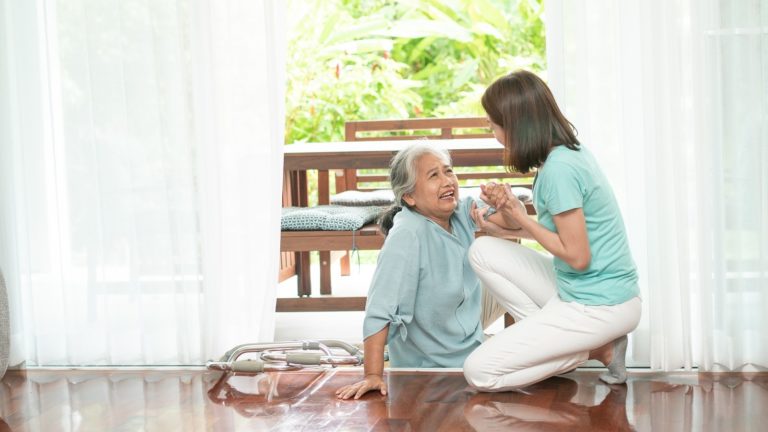Nothing is quite as upsetting as learning that your elderly parent has suffered a fall–especially if this isn’t the first incident. Unfortunately, falls are all too common among older adults as strength and balance alter over time. In fact, the Centers for Disease Control (CDC) reports that between one-third and one-half of all adults in the U.S. over the age of 65 will fall each year.
For elderly people, falling increases the risk of injuries, such as hip fractures and head injuries. In some cases, falls can even lead to accidental death. Although repeated falls in older adults can sometimes be a coincidence, they are often a sign that your loved one needs more help than you can provide.
In-home care providers can reduce fall risk factors, prevent falls, and treat fall-related injuries for older adults.
Is it Time for In-Home Help?
Assess the needs of your parent or parents. Home care professionals can provide elderly individuals with both medical and non-medical assistance. This allows elderly individuals to remain in their own home, enjoying a safe and comfortable quality of life. Having a care professional in your parent’s home also provides you with the peace of mind that comes with knowing that your loved one isn’t alone or at-risk.
Transitioning to In-Home Care
Transitioning to in-home care can be challenging for elderly individuals who want to retain their independence. Here are tips to adjust their current lifestyle as you and your parent(s) transition to an in-home help paradigm.
1. Broach the subject gently.
When you begin the discussion of in-home care with your parents, plan your words carefully. Make it clear that you are not trying to avoid your own responsibility for your parent, but that you are simply worried about his or her safety. Listen to your parent’s objections or concerns, and address each with respect and compassion.
2. Discuss what in-home care will encompass.
In many cases, you will be able to decide what tasks your in-home care provider will perform, what hours they will spend with your parent and what responsibilities your parent will retain for his or her own care and health conditions. Discuss all of these issues with your parent and involve him or her in the development of a plan for in-home care.
3. Keep your loved one’s routine the same.
Before in-home care begins, explain your parent’s usual routine to the in-home care provider. Ask the provider to stick to this routine as much as possible in order to avoid introducing too many changes at one time.
4. Begin in-home care gradually.
When transitioning your loved one to in-home care, make the change as gradual as possible. If you have been caring for your parent on your own, consider being present during the first few sessions of in-home care. During this time, allow the in-home care provider to take on more and more responsibility for your parent’s care each day.
Reduce the Risk of Older Adult Falls and Related Injuries
Centers for Disease Control and Prevention statistics cite 3 million older adults treated in emergency departments annually. Public health data tell us that adult falls are increasing.
Falls–and the injuries they can cause–don’t have to be inevitable, however. Some ways that children of elderly parents can mitigate the risk of falls and fall-related injuries include:
- Ensuring mom or dad stays physically active
- Keep stairways and hallways free of clutter
- Regularly sweep and clear sidewalks; de-ice and shovel in the event of snow or ice
- Ensure adequate lighting inside and outside of the home
- Keep furniture like coffee tables and ottomans out of high-traffic areas
- Install double-sided tape or slide-resistant backing to prevent trips on carpets and rugs
- Consider installing some of the following: handrails on both sides of staircases, shower seats, and support bars by bathtubs, showers, and toilets
- Immediately clean spills and leaks
- Stay on top of home maintenance and repairs, especially loose floorboards and tiles
- Make sure frequently-used and essential items (clothes, dishes, drinking glasses) can be easily reached
A few common-sense measures can help mitigate risk and keep seniors from falling.
Considering At-Home Care for Elderly Loved Ones
No one wants to admit that they need help. However, if your parent has fallen multiple times, faces a higher chance of falling, or shows other signs of needing additional assistance at home, it may be time to consider other options.
Adult children can reduce the long term risk of fall-related injuries–and overall fall risk–by choosing in-home care for their parents. Georgetown Home Care facilitates seniors’ ability to remain in their own homes through compassionate, expert help.

